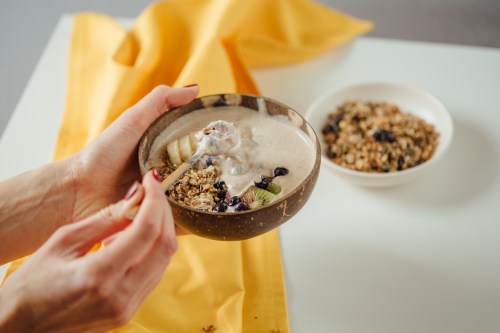Our editors independently select these products. Making a purchase through our links may earn Well+Good a commission
14 Relaxing Magnesium Products for Sleep That You Need to Add to Your Night Routine ASAP
Prepare for the best zzzs of your life.
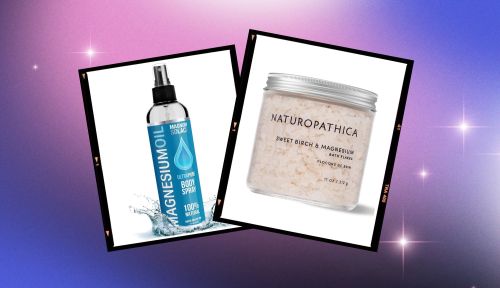
If you often spend nights tossing and turning in bed, trying your hardest to drift off to dreamland, you're in good company: 1 in 3 adults report not getting enough rest or sleep every night. Sure, there are medication options that you can suss out with your healthcare provider (of both the prescription and over-the-counter variety), but there are also plenty of natural ways to get some zzzs—magnesium being at the top of that list.
Experts in This Article
DBSM, licensed clinical psychologist, and PSYPACT-certified sleep specialist
board-certified sleep medicine physician and founder and CEO of Ognomy Sleep
Magnesium is an essential mineral found in our bones and soft tissue that helps the body maintain muscle and nerve function, and blood pressure and blood glucose (i.e., blood sugar levels). A wide body of research has found that magnesium can help manage certain health conditions like high blood pressure, osteoporosis (i.e., the weakening of bone), migraines, and type 2 diabetes, but studies are also shedding light on its potential role in promoting sleep and relaxation.1,2,3,4
“Magnesium is starting to be regarded as this super supplement that’s not only good at relieving headaches and muscle cramps but can relieve issues related to sleep,” says Daniella Marchetti, PhD, DBSM, a licensed clinical psychologist and PSYPACT-certified sleep specialist who focuses on treating insomnia, CPAP adherence, and circadian rhythm disorders in adults and children.
Research backs this up: A 2024 study from the European Society of Medicine found that taking a magnesium supplement resulted in significant improvements in sleep quality, duration, and mood in adults with nonclinical insomnia symptoms. The study co-authors concluded magnesium may be an effective, non-pharmaceutical way to promote sleep and mood.5 Other studies have also pointed to magnesium playing a helpful role in relieving symptoms of stress and anxiety.6
Ready to find out how magnesium might improve your shut-eye? Read on to find out more, along with the best magnesium products for sleep that I've tried out.
How magnesium promotes sleep
The connection between magnesium and sleep quality isn't fully understood, but the mineral is thought to help regulate neurotransmitters (i.e., the chemical messengers that transmit signals between your brain and body).7
“In essence, magnesium seems to block excitatory neurotransmitters like NMDA (N-methyl-D-aspartic acid) and enhance calming ones like GABA (gamma-aminobutryic acid)” potentially helping to both promote sleep and reduce stress by calming the nervous system during wakefulness, says Daniel Rifkin, MD, MPH, a board-certified sleep medicine physician and founder and CEO of Ognomy Sleep, a virtual sleep network providing comprehensive sleep apnea care.8,9
Dr. Marchetti says magnesium influences other hormones, too, by:
- Promoting the release of the sleep hormone melatonin
- Inhibiting the release of the stress hormone cortisol10
- Helping relax muscles by reducing lactic acid buildup, which can be beneficial for those with sleep disruptions caused by restless leg syndrome (a condition that causes leg pain while lying down) or leg cramps during pregnancy
How to get your daily dose of magnesium
The National Institute of Health (NIH) says about half of U.S. adults are magnesium deficient, with the recommended daily amount (RDA) being 310 to 400 milligrams for people ages 19 to 30 years old, and 320 to 420 milligrams for people over age 31. (Note the RDA for magnesium is higher if you’re pregnant or chestfeeding/nursing.)
Most often, Dr. Marchetti says you can hit your daily magnesium goals by eating foods rich in the mineral. This includes: nuts, seeds, avocados, salmon, bananas, leafy greens like spinach and collards, dark chocolate, beans, dairy, and soy products like tofu. However, if you have a true deficiency (which can be determined through bloodwork), a magnesium supplement might be recommended.
When it comes to supplements, there are many magnesium varieties to choose from, although Drs. Rifkin and Marchetti say magnesium glycinate is preferred because it's more easily absorbed by the body.11
Just keep in mind that some magnesium pills can cause side effects like nausea and diarrhea, especially when taken at higher doses. So if supplements tend to upset your gut, trying magnesium in a liquid form might be easier to digest, Dr. Rifkin suggests.
Another option is to apply magnesium transdermally—via the skin through lotions, sprays, and similar products. While research on the benefits and effects of transdermal magnesium is limited, one 2017 study found that people who applied a low-dose magnesium cream daily for two weeks had higher levels of magnesium in their blood and urine than those who used a placebo cream.12
Finally, although you can take magnesium at any time, taking it about an hour before bedtime is ideal if you’re using it to help you sleep, Dr. Rifkin adds.
The 14 best magnesium products for sleep
Now that you know about the potential benefits and dosage for magnesium for improved sleep, here is a list of products to take, drink, or apply to your body before heading to bed—most of which I've tried myself. (Just make sure to check in with your healthcare provider before trying any supplement to make sure it's right for you.)
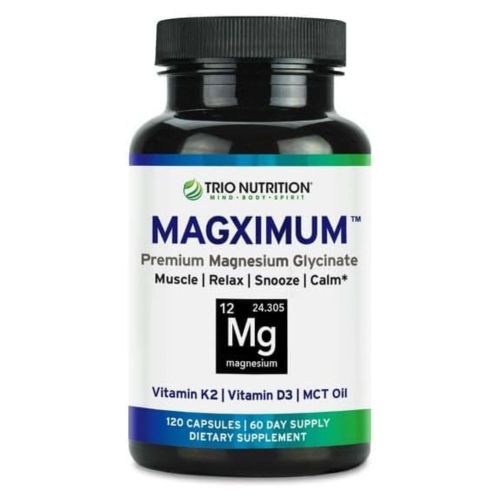
As someone who has tried a lot of magnesium supplements, Magximum is one of my favorites. (I start yawning and am ready for bed about an hour after taking two capsules.) Just one capsule contains 100 milligrams of magnesium glycinate and 10 micrograms of vitamin D3, 60 micrograms of vitamin K2, and 200 micrograms of MCT Oil (a supplement derived from coconut oil) for enhanced absorption.
Bonus: These capsules are easy to swallow, NSF-certified (a company that tests supplements for quality), free of major allergens, and come with a 60-day money-back guarantee.
Pros:
- Easily absorbed form of magnesium
- Small and easy to swallow
- 60-day money-back guarantee
Cons:
- May need to take more than one capsule depending on your dosage need
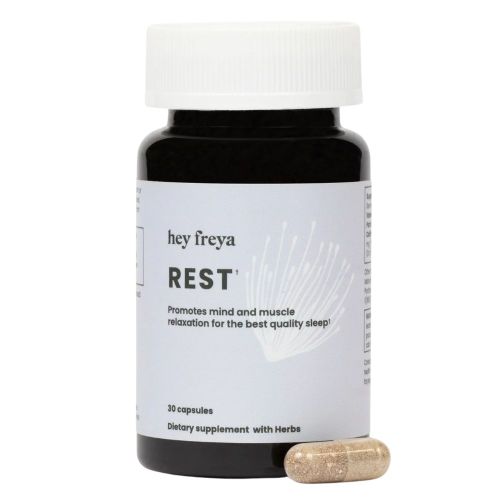
This pick from Hey Freya comes with 75 milligrams of magnesium bisglycinate (another type of magnesium that's easily absorbed in the body) in every capsule, along with other relaxation-inducing herbs and botanicals like L-theanine, passionflower, valerian root, and GABA.13 It's also a provider-formulated supplement that's free of GMOs, gluten, or melatonin (which can sometimes make you feel groggy the next day).
Although the dosage of magnesium is relatively low as far as supplements go, just one pill had me ready to doze off soon after taking it, and I slept like a baby.
Pros:
- Formulated with seven ingredients known to support sleep
- Melatonin-free formula
Cons:
- Might need to take more than one capsule
- Pricey
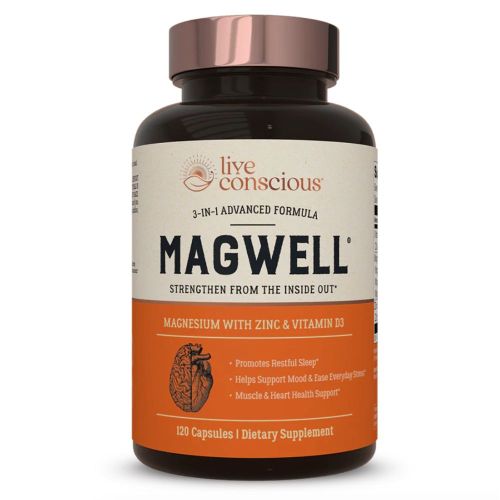
Two pills of this supplement offer 225 milligrams total magnesium in three forms—glycinate, citrate, and malate.14,15 The non-GMO supplement also has 25 micrograms of vitamin D and 7.5 milligrams of zinc per two capsules (which can help with immune health and cognitive function), and is formulated without the use of any major allergens.
Also, it's an affordable option as far as supplements go—you can opt to subscribe monthly and save—and it comes with a 365-day, 100 percent money-back guarantee.
Pros:
- Combination of three forms of magnesium
- Made without major allergens
- Affordable
Cons:
- Some users say it can take a few weeks to feel its effects
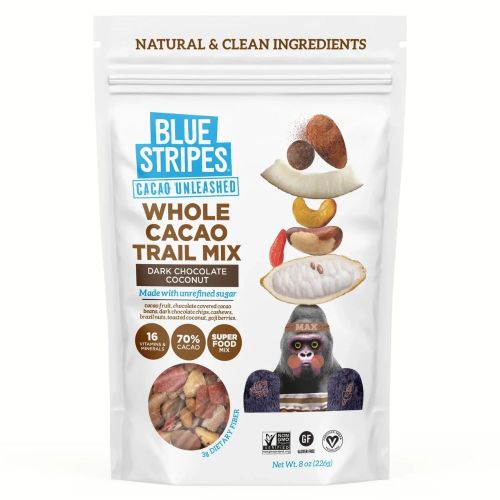
You can get your daily dose of magnesium from many foods, but IMHO, none are as delicious as Blue Stripes Whole Cacao Trail Mix. There are three varieties—Dark Chocolate Coconut, Peanut Butter Granola, and Mango Macadamia—each packing about 60 milligrams of magnesium per 1/4-cup serving, thanks to natural ingredients like cashews, Brazil nuts, and chocolate-covered cacao beans.
But good luck stopping with just one serving; I found it almost impossible not to devour the entire bag. Blue Stripes’ products also use the entire cacao pod, shell, fruit, and beans for an added superfood, antioxidant boost.
Pros:
- Delicious
- Non-GMO
- Natural ingredients with no additives, preservatives, or gluten
Cons:
- Not ideal if you have allergies to nuts or coconut
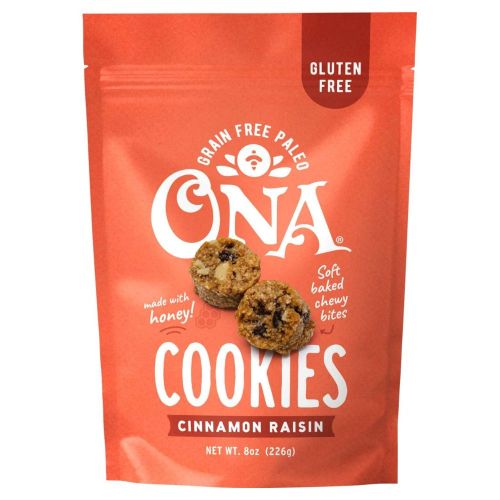
If you have food allergies or are simply looking for a naturally sweet treat for your magnesium dose, look no further than Ona Cookies. The gluten-, grain-, and dairy-free cookies are made with a magnesium-rich, almond-flour base, and full of natural ingredients like walnuts, coconut, cinnamon, and honey. Made by natural food company True Primal, these soft, delectable cookies are available in Brownie, Maple Pecan and Cinnamon Raisin (my personal favorite!) flavors.
Pros:
- Made with magnesium-rich almond flour
- Healthy ingredients free of gluten, grain, and dairy
- No artificial sweeteners
Cons:
- Slightly high in added sugars (from natural sources)
- Some users say it is overpriced
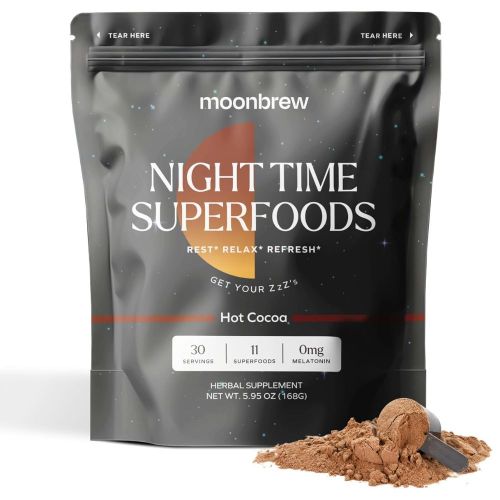
I gave up hot cocoa a long time ago due to its high sugar content, but this healthy version boasts 72 milligrams of magnesium glycinate and magnesium taurate (another popular form of magnesium), and zero sugar per serving (only the natural alternative called monk fruit).16 And it tastes just like the real thing!
The powder is super easy to mix with hot water or milk for a calming nightly wind-down drink. It also has calming amino acids (like L-theanine) and adaptogen blends (like reishi mushroom extract), and is melatonin-free, making it perfect if melatonin supplements give you morning drowsiness.
Pros:
- Zero sugar per serving
- Tastes great
- Melatonin-free
Cons:
- Pricey (even if you subscribe for the monthly deliveries, which is $38)
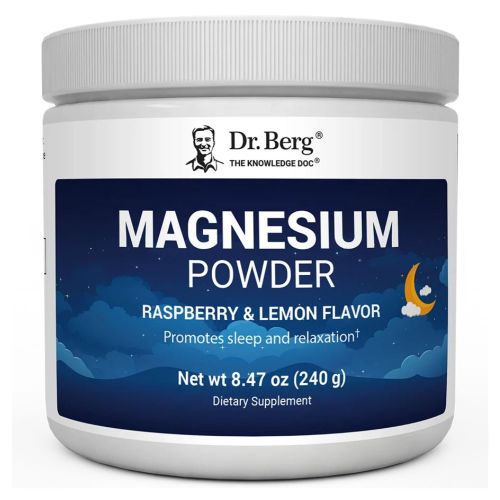
This strawberry-and-lemonade flavored powder packs 325 milligrams of highly absorbable magnesium glycinate into a one-scoop serving. “Specifically formulated to promote sleep, relaxation, and stress” according to the company, the powder is sweetened with Stevia and has only 10 calories per 4.7 gram serving.
Dr. Marchetti recommends mixing a low-sugar magnesium powder with unsweetened tart cherry juice to create your own version of the "sleepy girl mocktail" that went viral on TikTok. The drink can be “part of a relaxing nighttime routine that helps with sleep onset,” according to Dr. Marchetti.
Pros:
- Sweetened with Stevia
- Delicious flavor
- Low-calorie
Cons:
- Needs to be mixed with water, which isn’t always convenient
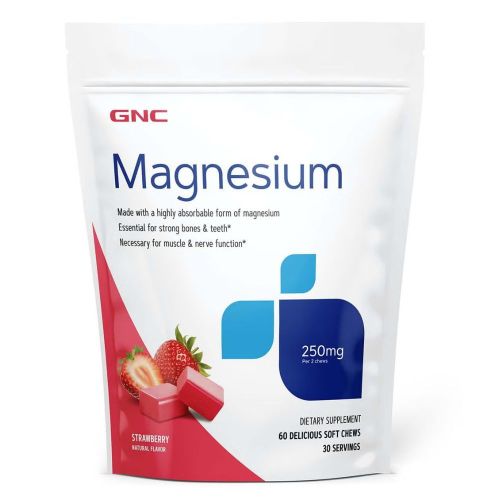
You’ll get 250 milligrams of magnesium citrate—a highly absorbable form, according to the company—in two of these sweet-flavored chews, which equals one serving. The chews are individually wrapped, and sugar- and gluten-free, although they do contain 4 grams of sugar alcohols per serving. The product also has gelatin, which means they aren’t suitable for vegetarian or vegan diets. One reviewer said they were happy to be taking an “enjoyable chew after dinner or just before bed” instead of another pill.
Pros:
- Easy to take
- Convenient
Cons:
- Contains sugar alcohols
- Not suitable for vegans or vegetarians
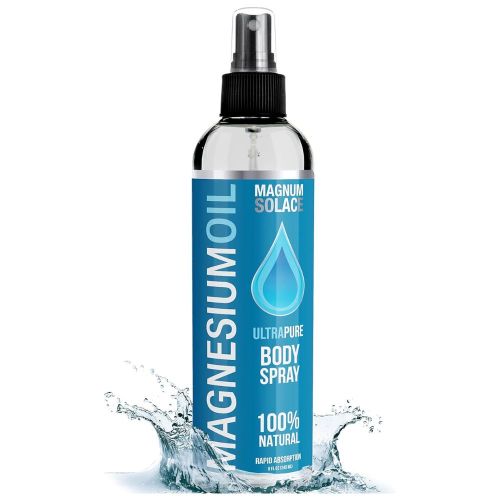
This odorless, clear oil has 220 milligrams of 100 percent absorbable magnesium chloride per 10 sprays—and no other ingredients except purified water. The spray is made without parabens, sulfates, or phthalates, and is vegan- and cruelty-free. You can spray it on your feet, legs, chest, or anywhere you feel discomfort, just before sleep. One reviewer called it an “insomniac’s best friend” and game-changer after using it for just five nights.
Pros:
- No ingredients except magnesium and pure water
- Easy to use
- Free of parabens, sulfates, and phthalates
Cons:
- Some reviewers complained product was too oily or caused itchiness

This lush, buttery skin cream infused with magnesium chloride and melatonin has become a must in my nightly routine.17 The light patchouli and lavender scent adds to the relaxing effect, while (bonus!) retinol and caffeine combine to tighten skin while you sleep.18 There’s also the trio of shea, cocoa, and mango butters to give skin a hydration boost.
I’ve been applying generous portions of the cream to my neck and shoulders just before I hit the sack, and find it totally helps me chill out. Bonus: All Nakery products use clean, vegan ingredients and are cruelty-free.
Pros:
- Infused with sleep-promoting magnesium and melatonin
- Pleasant scent
- Vegan and cruelty-free
Cons:
- It can feel a little thick
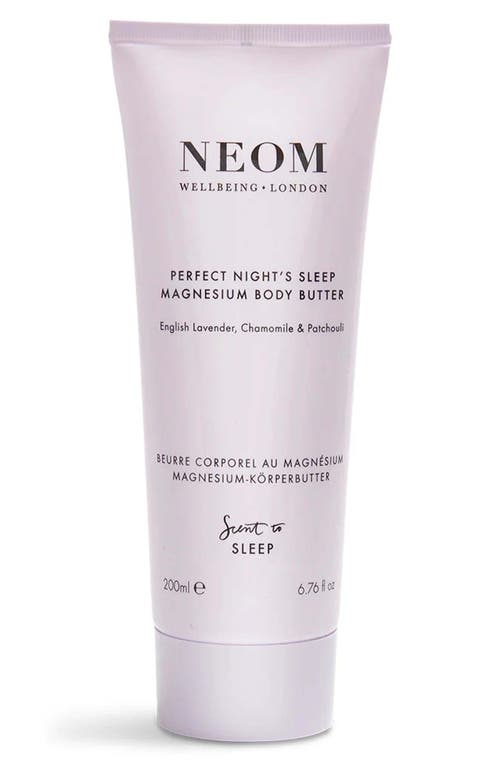
Part of the London wellness company’s line of magnesium body products, this body butter is formulated specifically to promote sleep with 88 milligrams of magnesium chloride per 5 milliliters of product. The blend of 14 natural, sleep-promoting essential oils like lavender, chamomile, and patchouli that give body butter an oh-so-relaxing scent, while shea butter, aloe vera, grapeseed oil, and coconut oil help soothe and hydrate. The product has a light texture, and I like to apply it to my legs at bedtime to help my muscles relax and ease into sleep.
Pros:
- Relaxing scent
- Skin-soothing ingredients
Cons:
- Tends to flake after application
- Expensive
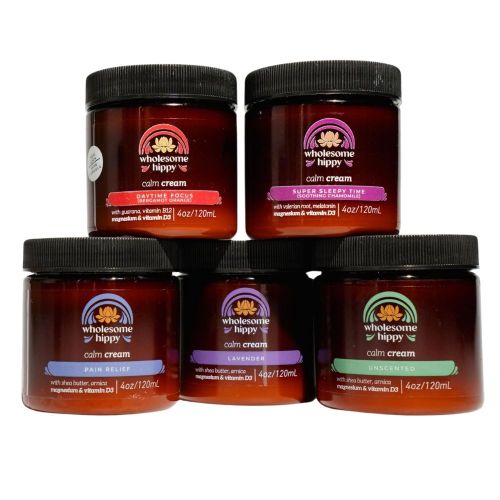
Magnesium chloride is blended with vitamin D3 to enhance absorption in this thick body butter made with all-natural, fair-trade sourced, vegan, and cruelty-free ingredients. I loved the calming peppermint and clove scent, along with the thick texture courtesy of shea, cocoa, and mango butters. Despite its rich texture, the cream absorbs easily. The small, 4-ounce jar is also perfect to pop in a bag for travel or in your purse to have with you whenever you need it.
Pros:
- Lush texture but absorbs easily
- Calming scent
- Easy to take on the go
Cons:
- Small jar doesn’t last long
- Pricey
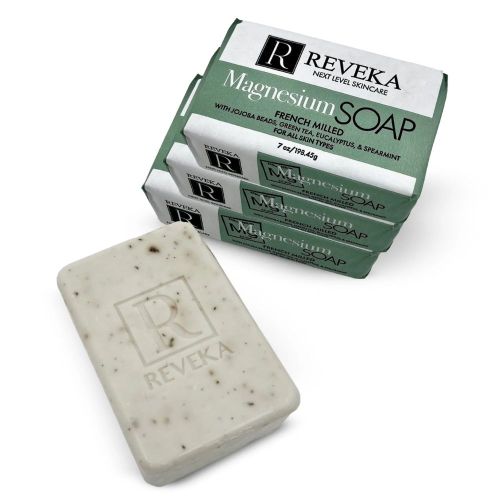
I’ve never been a bar soap girl, but Reveka Magnesium Soap has converted me. The preservative- and dye-free bar is French milled and uses only clean ingredients, including magnesium chloride from the Netherlands’ Ancient Zechstein Seabed, a source of pure, medical-grade magnesium chloride, according to the company.
This 4-in-1 bar is suitable for all skin types and can be used on the face and body, or as a shampoo or shaving cream. It also has green tea, eucalyptus, and spearmint to soothe the skin and the senses (seriously, you’ll love the smell!), and exfoliating jojoba beads for an added benefit.
Pros:
- Magnesium chloride sourced from an ancient seabed
- Soothing scent
- Suitable for even sensitive skin
- Travel-friendly
Cons:
- Although pleasant, the scent is on the strong side
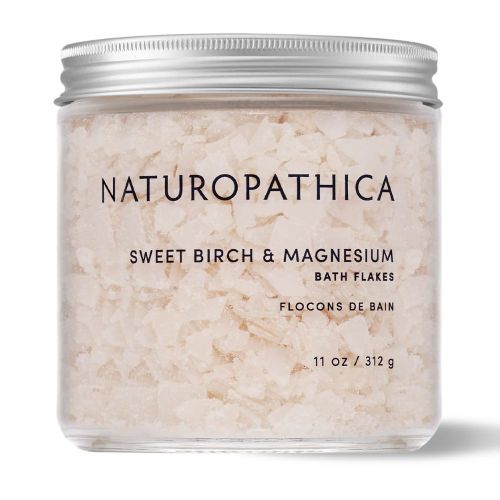
If you want to bring tranquility to your bathtub, this soak with magnesium chloride salts and sweet birch bark oil will have you saying “ahhh” in no time. The bath soak contains only natural ingredients like tapioca starch to help keep skin moisturized and free of irritation. Plus, it's cruelty-free, and the pink color looks pretty sitting on your bathroom countertop.
Pros:
- All-natural ingredients
- Cruelty-free
Cons:
- Pricey
- May not be suitable for sensitive skin or those allergic to tapioca
When to see a healthcare provider about your sleep
While magnesium can help promote sleep and relaxation, it’s not a “catch-all solution” for insomnia (a sleep condition characterized by the inability to fall asleep and excessive daytime sleepiness), notes Dr. Marchetti. Both experts say if you still have trouble falling or staying asleep, or experience extreme fatigue after about two weeks of practicing good sleep hygiene habits, it’s time to talk to a healthcare provider.
A behavioral sleep medicine specialist can help treat insomnia using therapies such as cognitive behavioral therapy (also known as CBTI), the “gold standard” in treatment, says Dr. Marchetti.
- Houston, Mark. “The role of magnesium in hypertension and cardiovascular disease.” Journal of clinical hypertension (Greenwich, Conn.) vol. 13,11 (2011): 843-7. doi:10.1111/j.1751-7176.2011.00538.x ↩︎
- Groenendijk, Inge et al. “Impact of magnesium on bone health in older adults: A systematic review and meta-analysis.” Bone vol. 154 (2022): 116233. doi:10.1016/j.bone.2021.116233 ↩︎
- Barbagallo, Mario, and Ligia J Dominguez. “Magnesium and type 2 diabetes.” World journal of diabetes vol. 6,10 (2015): 1152-7. doi:10.4239/wjd.v6.i10.1152 ↩︎
- Fatima, Ghizal et al. “Magnesium Matters: A Comprehensive Review of Its Vital Role in Health and Diseases.” Cureus vol. 16,10 e71392. 13 Oct. 2024, doi:10.7759/cureus.71392 ↩︎
- Breus, Michael, et al. “Effectiveness of magnesium supplementation on sleep quality and mood for adults with poor sleep quality: A randomized double-blind placebo-controlled crossover pilot trial.” Medical Research Archives, vol. 12, no. 7, 2024, https://doi.org/10.18103/mra.v12i7.5410.
↩︎ - Rawji, Alexander et al. “Examining the Effects of Supplemental Magnesium on Self-Reported Anxiety and Sleep Quality: A Systematic Review.” Cureus vol. 16,4 e59317. 29 Apr. 2024, doi:10.7759/cureus.59317 ↩︎
- Kirkland, Anna E et al. “The Role of Magnesium in Neurological Disorders.” Nutrients vol. 10,6 730. 6 Jun. 2018, doi:10.3390/nu10060730 ↩︎
- Jewett BE, Thapa B. Physiology, NMDA Receptor. [Updated 2022 Dec 11]. In: StatPearls [Internet]. Treasure Island (FL): StatPearls Publishing; 2025 Jan-. Available from: https://www.ncbi.nlm.nih.gov/books/NBK519495/ ↩︎
- Jewett BE, Sharma S. Physiology, GABA. [Updated 2023 Jul 24]. In: StatPearls [Internet]. Treasure Island (FL): StatPearls Publishing; 2025 Jan-. Available from: https://www.ncbi.nlm.nih.gov/books/NBK513311/ ↩︎
- Thau L, Gandhi J, Sharma S. Physiology, Cortisol. [Updated 2023 Aug 28]. In: StatPearls [Internet]. Treasure Island (FL): StatPearls Publishing; 2025 Jan-. Available from: https://www.ncbi.nlm.nih.gov/books/NBK538239/ ↩︎
- “Magnesium Glycinate.” Magnesium Glycinate - an Overview | ScienceDirect Topics, www.sciencedirect.com/topics/medicine-and-dentistry/magnesium-glycinate. Accessed 12 May 2025.
↩︎ - Kass, Lindsy et al. “Effect of transdermal magnesium cream on serum and urinary magnesium levels in humans: A pilot study.” PloS one vol. 12,4 e0174817. 12 Apr. 2017, doi:10.1371/journal.pone.0174817 ↩︎
- National Center for Biotechnology Information. "PubChem Compound Summary for CID 75487596, Magnesium bisglycinate" PubChem, https://pubchem.ncbi.nlm.nih.gov/compound/Magnesium-bisglycinate. Accessed 13 May, 2025. ↩︎
- National Center for Biotechnology Information. "PubChem Compound Summary for CID 6099959, Magnesium Citrate" PubChem, https://pubchem.ncbi.nlm.nih.gov/compound/Magnesium-Citrate. Accessed 13 May, 2025. ↩︎
- National Center for Biotechnology Information. "PubChem Compound Summary for CID 164748, Magnesium Malate" PubChem, https://pubchem.ncbi.nlm.nih.gov/compound/Magnesium-Malate. Accessed 13 May, 2025. ↩︎
- National Center for Biotechnology Information. "PubChem Compound Summary for CID 13343447, Magnesium taurate" PubChem, https://pubchem.ncbi.nlm.nih.gov/compound/Magnesium-taurate. Accessed 13 May, 2025. ↩︎
- “Magnesium Chloride.” Magnesium Chloride - an Overview | ScienceDirect Topics, www.sciencedirect.com/topics/pharmacology-toxicology-and-pharmaceutical-science/magnesium-chloride. Accessed 13 May 2025.
↩︎ - National Center for Biotechnology Information. "PubChem Compound Summary for CID 445354, Retinol" PubChem, https://pubchem.ncbi.nlm.nih.gov/compound/Retinol. Accessed 13 May, 2025. ↩︎





